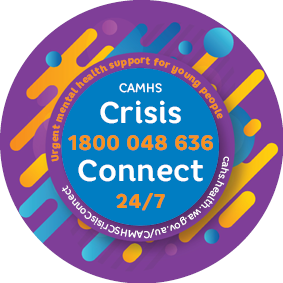Mental Health
Referrals of children, young people (under the age of 18 years) and their families to community mental health clinics can come from a:
- GP
- treating therapist
- specialist
- school
- community organisation
There is a designated person at every community mental health clinic who can provide advice and support on referrals and options in your area.
Find out the catchment suburbs for each Community CAMHS clinic.
Download the Community CAMHS referral form (PDF, 251KB)
Download the Community CAMHS referral form (RTF, 13MB)
Information for families
When referring, please download and print our Community CAMHS - About us information pack. It provides an introduction to the Community CAMHS service and what to expect.
Download Community CAMHS - About us (PDF 570kb)
Complex Attention Hyperactivity Disorders Service (CAHDS) is a multi-disciplinary Tier 4 assessment team within CAHS.
This service specialises in the assessment of children and young people who present with persistent and severe attentional difficulties and co-morbid complex behavioural, social/emotional disorders associated with the identified attentional difficulties.
The CAHDS team completes a wide range of bio-psychosocial assessments. The assessment is dependent on the child’s presentation and is determined by CAHDS. Assessments will involve the individual and the family. CAHDS may also liaise with the child’s school, and any other agency involved in their care where clinically indicated.
CAHDS role is to help clarify the diagnosis through our multidisciplinary assessment process and assist the referrer with treatment planning.
The clinic is located at Perth Children’s Hospital and operates during business hours.
Who we accept referrals from
- Paediatricians
- Neurologists
- Psychiatrists
- other authorised stimulant prescribers who have been treating the child for attentional issues
Unfortunately, CAHDS does not accept self-referrals or referrals from GPs.
Referral criteria
Referrals to be accepted into CAHDS must meet the following criteria.
Be aged 0-18 years and:
- currently prescribed/being considered for the prescription of medication to treat ADHD
- significant impairment for six months or more in ability to sustain attention and debilitating hyperactivity, on a daily basis, irrespective of environment prior to age 6 years
- marked educational deterioration or lack of developmentally appropriate school performance
- have the presence of severe attentional difficulties and hyperactivity resulting in significant learning and co-morbid behavioural and social/emotional difficulties for at least six months
- currently enrolled in an education or training program, unless the child is 5 years of age or younger
It is a pre-requisite that the referrer remains involved in the child’s care during and after CAHDS assessment as CAHDS does not respond to urgent referrals or provide an emergency response to referrals. This needs to be managed by the referrer.
As a referrer you will be notified of the outcome of the referral.
How to refer
The CAHDS referral form must be completed and submitted to refer a client to our program.
Please ensure that you are authorised to refer to CAHDS (see who we accept referrals from above) and have met our referral criteria above.
We do not accept referrals from GPs or self-referrals.
Download the CAHDS referral form (PDF, 215kb)
All referrals are triaged and assessed for suitability.
Contact us
Contact the Triage Officer at PCH, available Monday to Friday in business hours.
Phone
Referrals to Multisystemic Therapy are accepted from:
- School Psychologists
- Community Mental Health clinics
- Child Protection and Family Services
- Juvenile Justice
- GPs
- private health and mental health practitioners
Referral forms must be completed by a health professional in the company of a caregiver.
Please read the referral guidelines before completing the form. To discuss your referral, contact your relevant agency's MST referral manager or the MST office.
Download
Multisystemic Therapy referral form (Word document, 2MB)
Eating Disorders Service
- The program accepts referrals for young people up to 18 years.
- A written referral from a general practitioner (GP), psychiatrist or paediatrician is required for a full assessment and to access treatment through the Eating Disorders Program.
- The young person is then offered an appointment for a thorough assessment or alternative services that may be more suitable to their needs.
Find out more about the Eating Disorders Service at PCH
Gender Diversity Service
- Any child or young person up to the age of 18, who lives in Western Australia, can be referred to the GDS for consultation about concerns regarding their gender identity, gender non-conforming behaviour or gender dysphoria.
- A referral to the GDS is provided by a general practitioner (GP), paediatrician, psychologist or other health professional directly to PCH.
Find out more about the Gender Diversity Service at PCH
Mental Health Inpatient Unit (Ward 5A)
- We accept referrals from therapists, specialists, GPs, schools and other community organisations.
Find out more about PCH's Ward 5A
Paediatric Consultation Liaison Program (PCLP)
- Inpatient and outpatient referrals (for patients aged up to 18) are accepted from PCH medical and surgical consultants.
- Each referral is allocated to a health professional in the PCLP team who will make an initial assessment and provide the appropriate service.
Find out more about the Paediatric Consultation Liaison Program


